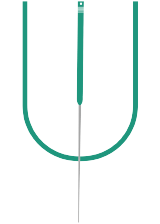I have to start this blog with a statement:
I like science, I want to understand the “why”and the “how”things work.
So, how come you are an acupuncturist, you will ask, very rightly.
Well, I also love to help people. I studied psychotherapy and then massage and while practicing, I felt that there were many links between the two, body and mind. There was a gap and I couldn’t bridge it.
So, I researched through most of the alternative ways of medicine and therapy and I found that Chinese Medicine and Acupuncture were resonating better with me, they had a very old history and tradition (so probably credentials), and it was all about the connection of body, mind and spirit/soul/emotions.

Long story short, I found that the best acupuncture school was the College of Integrated Chinese Medicine (CICM), in Reading, England, UK.
I applied, they accepted me – they actually offered me a place in the class ahead the one I applied for, which I rejected because I had clients in Athens and needed to finish all my business. Turned out to be the best decision I could make, as if I had rushed, I wouldn’t meet all these lovely and brilliant people who were then my classmates and now colleagues and some of them, true friends from the heart. Anyway, I went, I studied very hard and the way I see health, disease, relationships, therapy, people and life in general transformed completely.
But what is this Qi?
Enough with my journey though, this blog is about Qi, this notorious word that most people (including myself) translate as energy, or vital energy, in lack of a better explanation. Others go into detailed analysis of the Chinese character for Qi – I won’t, mainly because I can’t read Chinese, also because I don’t want to bore you, the reader.

However, you can translate Qi as energy, electromagnetic energy,
vital force, breath – pnoe in Greek which is related to pneuma, which in turn means soul.
So what is Qi?
I read recently Dr Daniel Keown’s book, “The Uncharted Body”in which he states that Qi amongst other things is an electrical force that carries information between cells.
It is a great book, explains in Western terms and scientifically the basics of Chinese medicine and a must-read for anyone who is practising it.

When I started studying at CICM, I wanted to ask so many things (much more that the million questions I did actually ask my teachers – if any of my lecturers arereading that, sorry lovely people for being a pain). The main question I had however, was WHAT QI? Meaning, what is Qi, where is it, how did we find about it 2.500 years ago, how do we know that it travels in these specific pathways/networks/channels that people call meridians, how do we affect it with tiny needles or even finger pressure?
I was happy to know years later that a friend of mine thought that the actual needles that acupuncturists use, had magic Qi in them and that’s how they healed the patient. To avoid embarassment, I will not state her name and to avoid any misunderstanding, NO! That is not the case. The needles are single use, sterile, made of normal steel usually, some from gold or silver.
However, the intention of the therapist (apparently) can travel through the needle and affect the patient, some of my teachers would say.
Early on the course, frustrated by not getting answers that would suffice my queries, I decided to just go with it and see for myself later on.
I’m glad I did so! Because I have seen acupuncture working miracles, that cannot be explained to me, even though I performed the treatments. It is the client and their Qi that is doing the work. People who haven’t had a proper night’s sleep for months, suddenly sleep deeply and sound all night through. People who lost some of their 5 senses, see them returning. Headaches, pains and aches that were fixed in places go away completely not to come back. Unexplainable panic attacks and ‘brain fogs’ improve substantially. A variety of emotional issues become understood and resolved.
Now, that is not to say that it works wonders every single time. Unfortunately, it doesn’t. Sometimes it only helps the person receiving the treatment, but it doesn’t change their life. And sometimes, very rarely, it doesn’t have an effect. These very few times (one could count them in one hand’s fingers) are the ones that make me wonder, was it a wrong diagnosis, was it the limited time the patient came for treatment and that they may needed more or was it that this Qi is all mumbo-jumbo, placebo nonsense.
But it isn’t!
It can’t be, not after all these patients coming back, giving me feedback that is almost like reading out of the handbook the effects of the treatment I gave them, when they have no idea about what treatment principles I used.
Does it even matter?

However, even if it is the power of their minds healing them, even if Qi didn’t exist, I honestly don’t mind at all! It wouldn’t change the way I work. Because at the end of the day, the reason I am a therapist, is to help people, whatever their issues are. I am only the means, the channel, and my treatment room is the place, where they come to look after themselves in these busy days we live. Acupuncture and Chinese Medicine gives me a way to think and treat. It gives me a structure. And even if it is just a trick (which I don’t believe it is) to reorganise their minds and get better, that’s enough for me. Mission accomplished.
